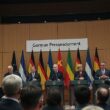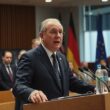The German economy’s recent rebound may prove to be short-lived, according to Federal Minister for Economic Affairs, Katherina Reiche. Speaking to the Frankfurter Allgemeine Zeitung, Minister Reiche expressed caution regarding recent upward revisions to growth forecasts by several economic research institutes. She stated that the current economic activity is, in part, driven by anticipatory effects ahead of potential US tariffs, which are not indicative of sustainable growth. A cooling of the economy following this early export surge is a distinct possibility.
Minister Reiche emphasized the crucial need for the European Commission to secure a favorable negotiating solution with the US government to mitigate the potential impact of increased tariffs. The German automotive industry and its supplier network are particularly vulnerable, facing challenges from both US tariffs and potential retaliatory measures imposed by the EU. Preventing such a double burden remains a priority.
Ahead of the upcoming EU-China summit, Minister Reiche signaled an ongoing review of Germany’s China strategy, acknowledging the increasingly significant economic, technological and military influence of the nation. She cautioned against underestimating this combination of geopolitical ambition and technological advancement.
A key area of concern is the lack of a robust German response in critical fields such as artificial intelligence and raw material security. Minister Reiche highlighted the need for greater German presence and innovation in these sectors. To address resource dependencies, the government is initiating projects for a German raw materials fund, which will be part of a broader Germany Fund managed by the KfW development bank. This fund will also support startups and infrastructure for energy projects.
Looking ahead, the subsidized electricity price for German industry, aimed at bolstering competitiveness, is slated for introduction in early 2026. The ministry anticipates allocating approximately four billion euros from the climate and transformation fund over three years, contingent on ongoing budget negotiations. The goal is to implement this initiative as swiftly as possible.





